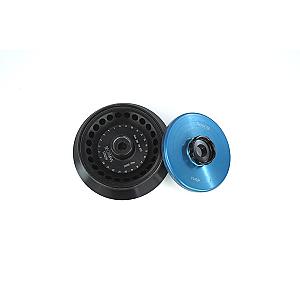The Beckman Coulter F2402H rotor is a hermetically sealed, fixed-angle rotor designed for Allegra, Avanti 30, Spinchron and GS-15 benchtop centrifuges. Capable of holding up to 24 tubes of 1.5 to 2.0 mL, it offers a total capacity of 48 mL and generates centrifugal forces of up to 61,970 × g. Constructed from anodised aluminium, it offers excellent corrosion resistance and ensures operator safety thanks to its hermetically sealed lid. Ideal for cell and molecular biology applications, it is also compatible with various adapters for volumes up to 0.25 mL.
F2402H Fixed Angle Rotor - Perfect Condition





Offer Details
Accessories :
Beckman Coulter F2402H Biocontainment Rotor 24 x 2mL 26000rpm 61,970 x g
Options :
5576
Description
F2402H – A high-performance, safe solution for centrifuging small biological volumes
The Beckman Coulter F2402H rotor is a high-performance centrifugation solution specifically developed for the demanding needs of research and diagnostic laboratories. Thanks to its hermetically sealed design, this rotor guarantees maximum safety when handling potentially pathogenic or sensitive samples. It is designed to fit a wide range of Beckman Coulter centrifuges, including the Allegra 64R, Avanti 30, Allegra X-30, X-22, 21 Series, GS-15 and Spinchron 15 models, ensuring versatility of use in multiple environments. This fixed-angle rotor is inclined at 45 degrees to the axis of rotation, allowing rapid and efficient sedimentation of biological particles, including cell organelles, viruses, bacteria, mitochondria, chloroplasts and algae.
The F2402H can hold up to 24 tubes of 1.5 to 2.0 mL, or smaller microtubes via adapters, with a maximum capacity of 48 mL per cycle. It reaches a rotation speed of up to 26,000 rpm in an Allegra 64R or Avanti 30, generating relative centrifugal forces (RCF) of up to 61,970 × g. The speed varies depending on the centrifuge model used, ensuring optimal adaptation to each equipment configuration. This rotor has a locking screw fastening system and a lid with a double O-ring seal to ensure the necessary tightness for protection against microbiological aerosols. Validated by third-party testing (CAMR or USAMRIID), this system is certified to effectively contain biological agents under normal operating conditions.
In terms of manufacturing, the F2402H rotor is made of anodised aluminium, a material that is resistant to corrosion and wear. Maintenance is easy thanks to the simple disassembly of components, and it is compatible with a wide range of cleaning and disinfection products, including ethanol, hydrogen peroxide and specific solutions such as RadCon. Regular cleaning and inspection of the O-rings is recommended to ensure optimal and long-lasting performance. In the event of biological or radioactive contamination, the rotor can be decontaminated according to current procedures and then autoclaved at 121°C for one hour.
This rotor is perfectly suited to a wide range of common laboratory applications: sample preparation for biomolecular analysis, cell fraction isolation, virus purification, or gradient centrifugation. It stands out for its compact size, fast speed ramp-up and ramp-down, and its ability to process a large number of small-volume samples simultaneously. Its robustness and safe design make it a strategic choice for laboratories seeking efficiency, versatility and safety.
Features
- Double O-ring sealed cover
- Fixed-angle rotor with excellent sedimentation efficiency
- Compatible with several Beckman Coulter centrifuge ranges
- Corrosion resistance thanks to anodisation
- Safety against microbiological aerosols (validated tests)
- Can be used with tubes from 0.25 to 2 mL (via adapters)
- Compatible with ethanol, peroxide and autoclave disinfection
- Easy to install thanks to the clamping screw and T-key
- Tube operating temperature: 2 to 25 °C
- Easy decontamination and cleaning with dedicated kit
Technical Details
- Type: Hermetically sealed fixed angle rotor
- Tube angle: 45°
- Maximum capacity: 24 x 2 mL tubes (total 48 mL)
- Maximum speed:
- Allegra 64R / Avanti 30: 26,000 rpm (61,970 × g)
- Allegra X-30R: 18,000 rpm (29,756 × g)
- Allegra X-22R: 15,500 rpm (22,065 × g)
- Allegra 21R / GS-15R: 15,300 rpm (21,499 × g)
- K factor: 185
- Acceleration time: 70 s (Allegra 64R)
- Deceleration time: 50 s (Allegra 64R)
- Tube dimensions: 11 × 45 mm (nominal)
- Weight when fully loaded: 2.06 kg
- Materials: anodised aluminium (black rotor, blue cover)
- Maximum density capacity: 1.2 g/mL
- Automatic identification via magnetic sensor
Compatible Accessories
- Compatible tubes:
- Polypropylene 1.5 mL (343169, up to 26,000 rpm)
- Polyethylene 1.8 mL (340196, max 10,000 rpm)
- Polyethylene 400 µL and 250 µL (various references)
- Available adapters:
- 361247: for 0.25 and 0.4 mL tubes (24 positions)
- 364690: for 0.5 and 0.75 mL tubes (24 positions)
- Spare parts:
- Complete rotor: 361171
- Lid: 369352
- O-ring (small): 974933
- O-ring (large): 974934
- Clamping screw: 361367
- T-wrench: 361371